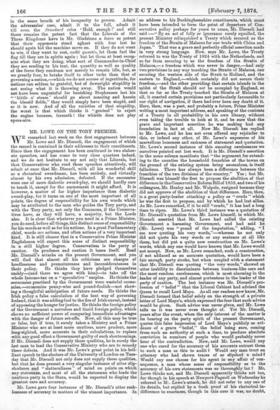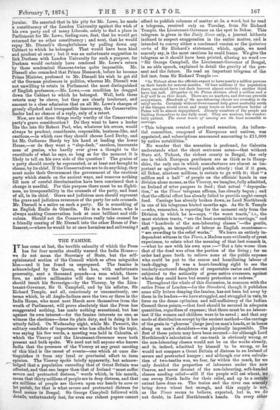MR. LOWE ON THE TORY PREMIER.
IATE remarked last week on the first engagement between
Mr. Lowe and Mr. Disraeli, the engagement of which the record is contained in their addresses to their constituents. Since then the engagement has been continued in two elabor- ate speeches, and has come to very close quarters indeed, and we do not hesitate to say not only that Liberals, but that Conservatives who read these speeches attentively, will admit at once that Mr. Disraeli, with all his wonderful skill as a rhetorical swordsman, has been entirely, and virtually almost by his own admission, defeated. If the encounter were one of mere dialectic sword-play, we should hardly care to touch it, except for the amusement it might afford. It is however, a matter of far higher importance than dialectic sword-play, for it turns on one of the most important of all points, the degree of responsibility for his own words which may be attributed to the man who guides the Tory party, and with the Tory party, not only the Commons, if the Conserva- tives have, as they will have, a majority, but the Lords also. It is clear that whatever you need in a Prime Minister, you do need, before all things, this distinct sense of responsibility for his words as well as for his actions. In a great Parliamentary chief, words are actions, and often actions of a very important kind. It is still clearer that in a Conservative Prime Minister Englishmen will expect this sense of distinct responsibility
in a still higher degree. Conservatism is the party of caution. On prudence and caution it bases itself. Read Mr. Disraeli's attacks on the present Government, and you will find that almost all his criticisms are charges of heedlessness and prematureness and inconsiderateness in their policy. He thinks they have pledged themselves rashly—(and there we agree with him)—to take off the whole Income-tax on a "speculative "surplus. He thinks the economies practised by the Government were wasteful econo- mies,—economies penny-wise and pound-foolish—not show- ing a thoughtful anticipation of future needs. He thinks the Irish policy a false calculation of the best way of governing Ireland, that it was adding fuel to the fire of Irish unrest, instead of appeasing the hunger for justice. He thinks the foreign policy of the Government a nerveless and timid foreign policy, which shows no sufficient power of comparing immediate advantages with the danger of future set-offs. Now, all this may be true or false, but if true, it surely takes a Ministry and a Prime Minister who are at least more cautious, more prudent, more long-sighted, more accurate in their calculations, to replace with any good effect a Government guilty of such shortcomings. If Mr. Disraeli does not supply these qualities, he is surely the last man to lead the Conservative Ministry who are to remedy these defects. And it was Mr. Lowe's great point in his bril- liant speech to the electors of the University of London on Tues- day that Mr. Disraeli not only does not supply these qualities, but that he does present a very singular instance of utter slip- shodness and " slatternliness " of mind on points on which any statesman, and most of all the statesman who leads the cautious party in the State, would be expected to display the greatest care and accuracy.
Mr. Lowe gave four instances of Mr. Disraeli's utter reck- lessness of accuracy in matters of the utmost importance. In
an address to his Buckinghamshire constituents, which must have been intended to form the point of departure of Con- servative policy perhaps for years to come, Mr. Disraeli had said :—" By an act of folly or ignorance rarely equalled, the present Ministry relinquished a Treaty which secured us the freedom of the Straits of Malacca for our trade with China and Japan." That was a grave and perfectly official assertion made in very strong language. Now, says Mr. Lowe, the Treaty referred to was the Treaty of 1824 with the Netherlands, and so far from securing to us the freedom of the Straits of Malacca,— a freedom which was never in danger,—had only two provisions in any way touching the Straits of Malacca, one securing the western side of the Strait to Holland, and the eastern to England,—which certainly did not secure their freedom,—and the other providing that certain islands in the midst of the Strait should not be occupied by England, so that so far as the Treaty touched the Straits of Malacca at all, it enacted certain provisions not particularly favourable to our right of navigation, if there had ever been any doubt of it. Here, then, was a past, and probably a future, Prime Minister writing a most important address, and speaking of the contents of a Treaty in all probability in his own library, without even taking the trouble to look at it, and be sure that the grave and important assertion he was making had any foundation in fact at all. Now Mr. Disraeli has replied to Mr. Lowe, and he has not even offered any rejoinder to this, or indeed any other, of Mr. Lowe's exposures of his marvellous looseness and rashness of statement and quotation. Mr. Lowe's second instance of this amazing carelessness we ourselves pointed out last week. It is Mr. Disraeli's assertion in the same solemn manifesto that "the argument for extend- ing to the counties the household franchise of the towns on the ground of the existing system being anomalous, is itself fallacious. There has always been a difference between the franchise of the two divisions of the country." Yes ; but Mr. Disraeli was himself the first to propose the abolition of that difference in the Conservative Reform Bill of 1859, and two of his colleagues, Mr. Henley and Mr. Walpole, resigned because they did not approve of the abolition of that difference. Here, then, is a great party-leader attacking a policy as "crude " which he was the first to propose, and by which he had lost allies. As Mr. Lowe remarked, if it be still "crude," it has had a long time to ripen. Mr. Lowe's third instance was a quotation of Mr. Disraeli's quotation from Mr. Lowe himself, in which Mr. Disraeli asserted that Mr. Lowe had called the existing Government a harassing Government, and had said he (Mr. Lowe) was "proud of the imputation," adding, "I am now quoting his very words,"—whereas he not only did not quote his very words or any sentence at all like them, but did put a quite new construction on Mr. Lowe's words, which any one would have known that Mr. Lowe would not accept. Now, as Mr. Lowe remarked, such a construction, if not adduced as an accurate quotation, would have been a fair enough party stroke, but when coupled with a statement that Mr. Disraeli was quoting "the very words," showed an utter inability to discriminate between business-like care and the most random carelessness, which is most alarming in the leader of any party, and almost portentous in the leader of the party of caution. The last instance was Mr. Disraeli's pro- fession of " belief" that the Liberal Cabinet had advised the Queen to recall Lord Mayo. As all our readers now know, Mr. Disraeli formed that belief solely on the strength of a private letter of Lord Mayo's, which expressed the fear that such advice would be given. Such advice was never given, and Mr. Lowe tells us it was never even thought of. Yet Mr. Disraeli, years after the event, when the only interest of the matter is its bearing on the party spirit of the present Governments quotes this false impression of Lord Mayo's publicly as evi- dence of a grave "belief," the belief being snre, coming from such an authority at such a time, to produce absolute conviction in numbers of people who would probably never hear of the contradiction. Now, said Mr. Lowe, would any one who cared for the accuracy of his accounts entrust them to such a man as this to audit ? Would any man trust an attorney who had shown traces of so slipshod a mind ? Would any one choose for his agent in any affair of con- sequence, a man whose sense of responsibility as to the accuracy of his own statements was so thoroughly lax ? Mr. Lowe thinks not, and Mr. Disraeli apparently thinks not too, for though in his speech at Newport-Pagnell on Wednesday he referred to M:. Lowe's attack, he did not refer to any one of its details, but replied by a fresh proof of his rhetorical in- difference to exactness, though in this case it was, no doubt,
jocular. He asserted that in his pity for Mr. Lowe, he made a constituency of the London University against the wish of his own party and of many Liberals, solely to find a place in Parliament for Mr. Lowe, feeling sure, first, that he would get returned for no other constituency ; and next, that he would repay Mr. Disraeli's thoughtfulness by pulling down any Cabinet to which he belonged. That would have been kind and prudent at once ; but it was an unfortunate suggestion to link Durham with London University for such a purpose, for Durham would certainly have rendered Mr. Lowe's return by these academical Siamese-twins quite impossible. Mr. Disraeli also remarked that Prince Bismarck, before he became Prime Minister, professed to Mr. Disraeli his wish to get rid of the German professors in politics, whereas Mr. Disraeli was not unwilling to retain in Parliament the most distinguished of English professors,—Mr. Lowe,—on condition he dragged down the Cabinet to which he belonged. Well, both these retorts may be clever, but they are clearly irrelevant, and amount to a clear admission that on all Mr. Lowe's charges of grossly slipshod and irresponsible inaccuracy, the Conservative leader had no chance of a reply, only of a retort.
Now, are not these things really worthy of the Conservative party's grave consideration ? Do they want to have a leader like the late Sir Robert Peel, who, whatever his errors, would always be prudent, considerate, responsible, business-like, and cautious,—in which case they should choose Lord Derby, and let Mr. Gathorne Hardy try his hand at leading the lower House,—or do they want a "slap-dash," careless, inaccurate man of genius, who hardly ever gives a thought to the exactitude of what he says, so long as for the moment it is likely to tell on his own side of the question ? The genius of a party should surely be represented, or at least not brought to shame, by its chief. If the Conservatives are to do anything, they must make their Government the government of the cautious party which stands on the ancient ways, and removes nothing till men of careful discrimination have been convinced that a change is needful. For this purpose there must be no flighti- ness, no irresponsibility in the counsels of the party, and least of all, in its chief. Grave and judicious men should represent the grave and judicious reverence of the party for safe counsels. Mr. Disraeli is a satire on such a party. He is something of an English Emile de Girardin. He is a freelance, who is always making Conservatism look at once brilliant and ridi- culous. Should not the Conservatives really take counsel for a friendly coaxing of Mr. Disraeli into the other House of Par- liament,—where he would be at once harmless and enlivening ?



































 Previous page
Previous page